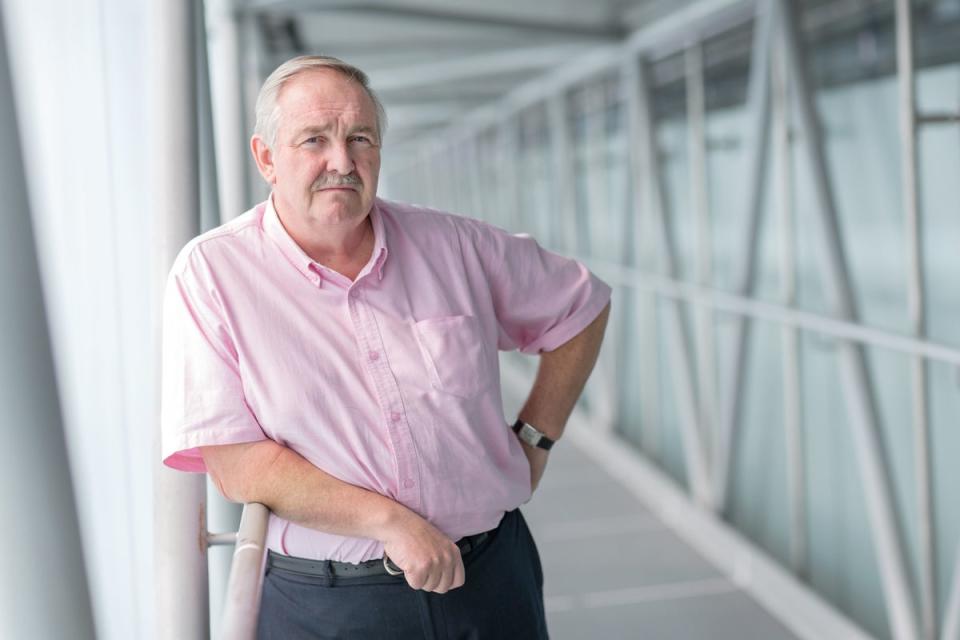As Australia legalises MDMA and psilocybin for medical use, we go inside one London psychedelics clinic

At first glance, the clinic looks more like a spa than a mental healthcare facility.
Situated on a cobbled mews street in Bloomsbury, it is Awakn Life Sciences’ first London outpost, and London’s first psychedelic psychotherapy clinic. “It’s the moss,” says Awakn’s COO, James Collins, gesturing towards the lush green ‘feature wall’ growing behind the reception desk. “It gives it a warm, welcoming feel, I think.” Later he will take me to see a huge tree which is growing right through the middle of the clinic’s relaxation area (where patients unwind after their psychedelic experiences). It’s quite astounding to see a tree this big growing indoors — “fake, sadly,” he says — though, he continues, research suggests that after a trip being in the natural environment “promotes therapeutic healing — so we’ve tried to do that whole outside-inside thing.”
Psychedelic psychotherapy is one of the latest innovations in psychiatry; patients with anything from depression and PTSD to eating disorders and anxiety can be treated — and if evangelists are to be believed, actually cured — using a mix of traditional talking therapy and high dose psychedelic drugs.
The treatment has proven so promising that today the Austrailian government even announced it would be changing the classification of two compounds, psilocybin (the active ingredient in magic mushrooms) and MDMA, so that from July 2023 they can be prescribed by psychiatrists to treat depression and PTSD. It’s a landmark move for a westernized country but it has been a long time coming. As far back as 2018, psilocybin was given ‘breakthrough therapy status’ by the US Food and Drug Administration (FDA), when used as a treatment for depression. Industry insiders are
The breakthrough therapy designation is reserved for drugs that “demonstrate substantial improvement over available therapy” — and indeed trials where patients were given a high dose of the drug, in conjunction with talking therapy, showed promising results on people who’d failed to respond to traditional antidepressants. In a similar study in 2020, after two sessions of psilocybin and eleven hours of talking therapy spread out over the weeks before and after the drugs were given, 71% of patients saw their depressive symptoms reduced by half — and half went into a remission, meaning they no longer qualified as being depressed.
It is results like these which led the Australian government to announce that: “the decision acknowledges the current lack of options for patients with specific treatment-resistant mental illnesses. It means that psilocybin and MDMA can be used therapeutically in a controlled medical setting.”

Professor David Nutt is a psychiatrist, chief research officer at Awakn and one of the world’s leading researchers in the psychedelic space (he also holds the dubious honour of having been sacked from his job as chief drug advisor to Gordon Brown’s government after claiming that LSD and ecstasy were less dangerous than alcohol). “From a neurological perspective,” he explains, “conditions like depression, anxiety and all kinds of addictions are characterised by repetitive thinking.” The more we repeat a behaviour or thought, the deeper that particular neurological pathway becomes.
“Often there’s a trauma which sparks the negative thoughts or behaviours — but once they’ve become encoded in the brain, they’re very difficult to break out of.” He uses the metaphor of ‘defragging a computer’ to explain how psychedelic drugs work — “breaking down all those old systems, clogged by viruses and unuseful data, and allowing new ones to form. A kind of reset for the brain.” During a psychedelic ‘trip’, patients often experience powerful hallucination; in that state the brain becomes more malleable, and remains so for the days following, “which is where the talking therapy comes in,” says Nutt. “We can begin to assess the old behaviours and thought patterns more objectively - and try to form new, healthier ones.”

Problematically for researchers, most psychedelics — including LSD, psilocybin and MDMA, (which has become one of the leading compounds in the treatment for severe PTSD) — remain illegal in most countries, including the UK.
Tom McDonald is the CEO of Clerkenwell Health, the London-based clinical research firm which specialise in psychedelic drug development. As he explains: “The news about Australia is certainly exciting. And in the USA, Rick Doblin, the CEO of the Multidisciplinary Association for Psychedelic Studies (MAPS) has said he expects full authorisation for MDMA around April 2024. It’s much harder to say for the UK — though 2025 is not unrealistic.”
Despite that, he argues that London is a hub for this new research. “Look at the strong academic pedigree with Kings, Imperial and UCL all conducting large volumes of academic and commercial research in this area. We are also seeing many international players run their clinical trials in the UK – for example, we are currently working with 5 clients from North America/Canada.”
In the meantime, though, the only drug which can mimic these effects on the brain but is also currently licensed for medical use is ketamine (a dissociative hallucinogen, commonly used in hospitals as an anaesthetic — and the only drug used on patients who visit Awakn).
Still, while many clinicians agree that it’s not the ‘ideal’ psychedelic, it has shown some promising results: in recent months experts at the University of Exeter (running an NHS-funded clinical trial) found that alcoholics treated with the same ketamine-and-therapy combination that Awakn use at their clinic, were two-and-a-half times more likely to stay sober for six months following treatment compared to people who were offered just talking therapy.
Some patients have profound epiphanies, experiencing powerful hallucinations which centre on the trauma that’s been driving their addiction or depression
“When a patient comes to us, we begin with two one hour prep sessions a week apart,” says Collins. “In these, the patient gets to know the therapists they’ll be working with and begins to understand what’ll be involved in their treatment.” For the next four weeks, there is a pattern of ketamine sessions followed by ‘integration’ therapy. “We give the ketamine as an injection,” explains Collins. What happens when the drug takes effect differs from patient to patient — some have profound epiphanies, experiencing powerful hallucinations which centre on the trauma that’s been driving their addiction or depression.
Others report losing all sense of their bodies and feeling profound love and peace. One participant in the University of Exeter trial experienced a feeling of being back in the womb and born again. “At these points the therapists are there mainly just to oversee — the patients are largely laying down and incapacitated. We have some nice weighted blankets they can cover themselves with, to feel kind of safe and cocooned. With the integration sessions afterward, we’ve developed a new type of therapy which borrows principles from a number of disciples — CBT, mindfulness — which help people to process what they experienced, and what it means for their condition.”
The first intake of patients from their clinic in Bristol (which opened in 2021) have now completed their treatment course. “We’re seeing some really profound results,” says Collins. And with their Bloomsbury clinic, Awakn is continuing its mission to become Britain’s best-known purveyor of psychedelic psychotherapy. To call them the ‘McDonald’s of psychedelics’ risks making light of the scientific rigour with which they’re approaching this new frontier in mental healthcare — but their plan to open a clinic on major high streets across the country does have a ring of the golden arches about it. “It’s about normalising treatment for mental health conditions,” says Collins.
“People should have access to a treatment which is fast-acting and doesn’t require as much maintenance as taking a daily antidepressant, or years of talking therapy.” The cost is £7,500 for a course treatment (including the four drug-assisted sessions), though as Collins points out: “If someone has a problem with alcohol they might spend anywhere from £5,000 to £40,000 on a week of rehab. At Awakn we’re offering an eight week course of treatment and it has a much stronger efficacy; there’s the chance to make some genuine functional change in a patient’s life.”

It is claims like these — that psychedelics might offer truly curative solutions to mental health conditions that have long been considered incurable — which have prompted such huge interest in the industry. It also doesn’t hurt that a growing number of celebrities have come out in support of using psychedelics in therapeutic settings. Last year, former heavyweight champion Mike Tyson became an advisor for the board of Wesana Health, a Chicago-based company who’re developing psychedelic medicines for the treatment of repetitive brain injury (treatment of neurological conditions is a promising new avenue for psychedelics, which have more commonly been associated with mental health). “I believe if I’d been introduced to the benefit of psychedelics for therapeutic use early in my professional career, I would have been a lot more stable in life,” he said at the time. “I had a lot of public outbursts and they were all mental illness related. Prescription drugs meant I didn’t feel like myself but with psychedelics I feel I’m a happier, lighter version of me.”

Actor Megan Fox told American talk show host Jimmy Kimmel that a recent ayahuasca ceremony she participated in in Costa Rica “surpasses anything you could do with talk therapy or hypnotherapy, any of those things” (she also told him that it made her feel like she’d spent an eternity in hell — which perhaps brings the power of these drugs into stark relief). Hunter Biden — the President’s son — wrote candidly in his memoir Beautiful Things about being given ibogaine, a plant-based psychedelic at a clinic in Mexico, in a bid to curb his lifelong addiction to drugs and alcohol (he hallucinated a “slideshow” of his life — the experience kept him sober for a year). And of course, there is Joe Rogan. “A slightly contentious character,” says Clara Burtenshaw, Partner and Investor at Neo Kuma Ventures — Europe’s first psychedelics-focused venture capital fund which was founded in 2020. Rogan, Spotify’s most popular podcaster, has long been a supporter, often inviting some of the psychedelic industry’s best known scientists and advocates to be interviewed on his show. “Like all things,” continues Burtenshaw, who has spent the past two years seeking out and investing in companies which are operating in the psychedelic biotech space. “If there’s a person you connect with doing or saying something, you’re more likely to listen than if it’s just a random scientist or politician, so I think the fact that well-known figures are talking openly about their experiences is an important step… and Joe Rogan has a huge audience.”
Early promise in clinical trials has also translated into some astronomical valuations for the companies operating in this space, as investors sense a coming sea-change in the way we treat mental health and attempt to get in ‘on the ground floor’ at psychedelic biotech companies — often even before new drugs or treatments have gone into development. In the past two years many psychedelic companies (including Awakn) have floated on stock exchanges in London, New York and Canada. Most famously, Compass Pathways — the company whose research led to the ‘breakthrough therapy’ designation for psilocybin — was valued at $1.3bn just a month after it floated on the Nasdaq in 2020.
The sums involved have led some within the psychiatric community to question whether treatments are quite as effective as psychedelics evangelists would have us believe (more on this in a moment), but the fact that Awakn are already planning to open a third clinic is perhaps indicative of how ready we — as a society — are for a shake-up within the world of mental healthcare.
Problematically there doesn’t seem to be the same political appetite for the decriminalisation of those crucial compounds here in the UK as there is in the US, where some states have already legalised psilocybin for therapeutic use. In the UK, psilocybin, MDMA and LSD are all Class A drugs and possession alone carries up to a 7 year prison sentence. Even academic researchers who want to use it in clinical trials have to jump through so many regulatory hoops that it can make the trials prohibitively expensive. “I think Dominic Cummings was quite interested in making it easier for researchers,” says Professor Nutt, “and there were sensible conversations happening with Number 10 about accelerating British research in this field. But then, of course, he disappeared.”
He warns that this gold rush mentality is leading to “commercial opportunism” where some companies are putting profits ahead of their patients’ wellbeing.
In the meantime, though, ketamine-assisted psychotherapy has been working really well, says Collins. And perhaps elsewhere, a slow and steady approach is no bad thing. Dr Jeffrey A. Lieberman is one of the world’s most pre-eminent psychiatrists — professor and chairman of Psychiatry at Columbia University in New York and the director of New York State Psychiatric Institute. As he points out: “[psychedelic] drugs are of potentially great value — and it’s important that we are able to study them in a deliberate and rigorous way. However, the genie’s got out of the bottle too fast — things are moving ahead too quickly.” He’s become an important voice in a growing movement which is attempting to dampen the furore around these new treatments. He warns that this gold rush mentality is leading to “commercial opportunism” where some companies are putting profits ahead of their patients’ wellbeing. He also argues that, if we drill down into the data, the studies which have caused the most excitement around, say, the treatment of depression using psychedelics, “showed not robust superiority to a standard antidepressant, it showed kind of marginal superiority on some things.”
While he’s not anti-psychedelics, he warns that attempting to roll out any kinds of mental healthcare treatments before they’ve gone through the usual years-long development process risks setting a promising industry back. “You look at some of the ketamine clinics operating in the US and they don’t have a methodology, there’s no standardisation. And [without enough data] how do you know that the therapy adds anything? If you just give the drug alone, will it work just as well? It all seems very ‘cart before the horse.’”
Still, it’s hard not to be excited about promising innovations in a facet of the medical field which hasn’t innovated in decades. In the days after my meeting with Collins, the royal college of psychiatry releases an analysis which shows a huge increase in referrals to NHS mental health services over the period of the pandemic. Collins admits that they are operating at the vanguard of the mental healthcare industry but argues that given the amount of unmet need it’s important to start offering these groundbreaking solutions to people now. “This is a true revolution,” he says. “And the potential for the people we could help is astronomical.”

 Yahoo Movies
Yahoo Movies 
